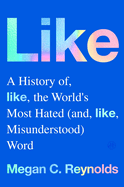
"Every woman I spoke to had a story about how someone at some point made her feel badly for saying 'like,' " writes Megan C. Reynolds in the conclusion to Like: A History of the World's Most Hated (and Misunderstood) Word, effectively summing up what she has spent the preceding pages exploring. "Like," a maligned word that's often called ungrammatical, is also an exceptionally useful filler word and multiuse modifier. Full of interesting details, humorous asides, and vindication for all the readers who ever had a teacher put hatch marks on the board every time a student uttered "like" in class, Like is a cathartic, enjoyable, and accessible read.
Reynolds touches on such disparate topics as Valley Girl speech and podcasting as she explores the meanings and cultural impact of the use--or deliberate exclusion--of the word "like." She even asks, "Can we make a case for 'Like...' to be a full sentence?" In discussing the sexism associated with the disdain for "like," Reynolds brings up the word "dude," explaining that it's "as useful as 'like' and just as prevalent but receives very little of the vitriol reserved for 'like'--and, by logical extension, women." Furthermore, while it's commonly perceived as a female speech pattern, men use "like" just as often, if not more, than women.
Perfect for readers of Gretchen McCulloch's Because Internet (which features heavily in Reynolds's final chapter), Amanda Montell's Cultish, or Kate Kennedy's One in a Millennial, Like is more than an exploration of grammar and usage. It's, like, a love letter to the way teenage girls shape the English language. --Alyssa Parssinen, freelance reviewer and, like, former bookseller

